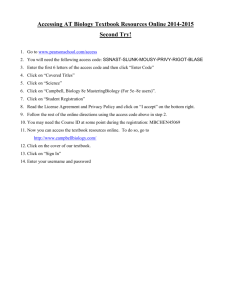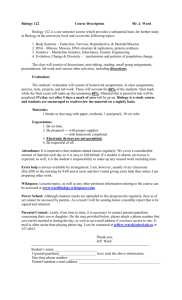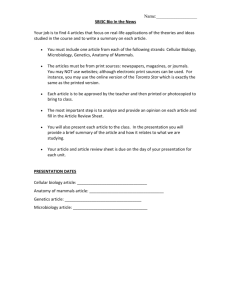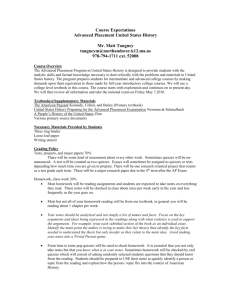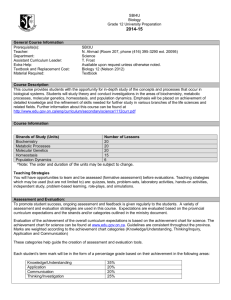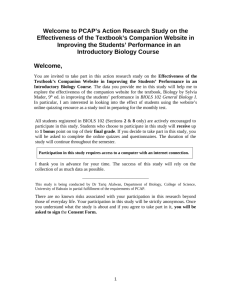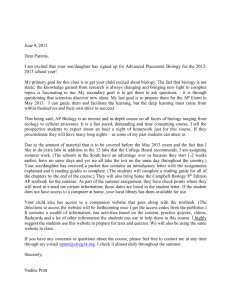IB Lincoln High Rules - LHSIBBiology
advertisement
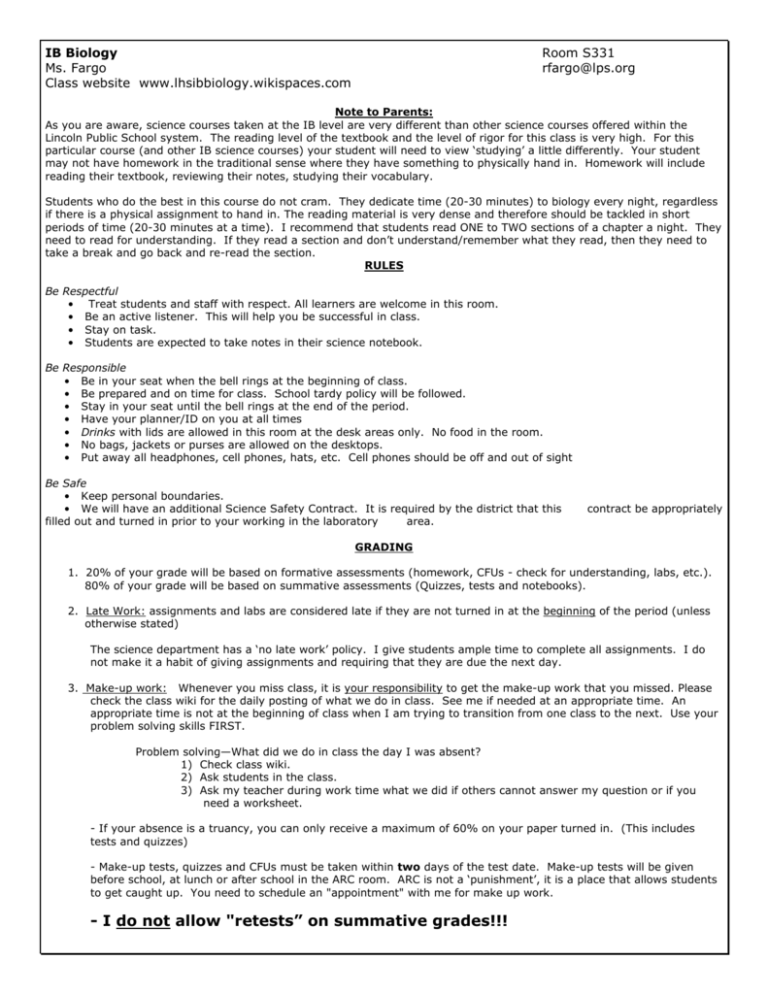
IB Biology Ms. Fargo Class website www.lhsibbiology.wikispaces.com Room S331 rfargo@lps.org Note to Parents: As you are aware, science courses taken at the IB level are very different than other science courses offered within the Lincoln Public School system. The reading level of the textbook and the level of rigor for this class is very high. For this particular course (and other IB science courses) your student will need to view ‘studying’ a little differently. Your student may not have homework in the traditional sense where they have something to physically hand in. Homework will include reading their textbook, reviewing their notes, studying their vocabulary. Students who do the best in this course do not cram. They dedicate time (20-30 minutes) to biology every night, regardless if there is a physical assignment to hand in. The reading material is very dense and therefore should be tackled in short periods of time (20-30 minutes at a time). I recommend that students read ONE to TWO sections of a chapter a night. They need to read for understanding. If they read a section and don’t understand/remember what they read, then they need to take a break and go back and re-read the section. RULES Be Respectful • Treat students and staff with respect. All learners are welcome in this room. • Be an active listener. This will help you be successful in class. • Stay on task. • Students are expected to take notes in their science notebook. Be Responsible • Be in your seat when the bell rings at the beginning of class. • Be prepared and on time for class. School tardy policy will be followed. • Stay in your seat until the bell rings at the end of the period. • Have your planner/ID on you at all times • Drinks with lids are allowed in this room at the desk areas only. No food in the room. • No bags, jackets or purses are allowed on the desktops. • Put away all headphones, cell phones, hats, etc. Cell phones should be off and out of sight Be Safe • Keep personal boundaries. • We will have an additional Science Safety Contract. It is required by the district that this filled out and turned in prior to your working in the laboratory area. contract be appropriately GRADING 1. 20% of your grade will be based on formative assessments (homework, CFUs - check for understanding, labs, etc.). 80% of your grade will be based on summative assessments (Quizzes, tests and notebooks). 2. Late Work: assignments and labs are considered late if they are not turned in at the beginning of the period (unless otherwise stated) The science department has a ‘no late work’ policy. I give students ample time to complete all assignments. I do not make it a habit of giving assignments and requiring that they are due the next day. 3. Make-up work: Whenever you miss class, it is your responsibility to get the make-up work that you missed. Please check the class wiki for the daily posting of what we do in class. See me if needed at an appropriate time. An appropriate time is not at the beginning of class when I am trying to transition from one class to the next. Use your problem solving skills FIRST. Problem solving—What did we do in class the day I was absent? 1) Check class wiki. 2) Ask students in the class. 3) Ask my teacher during work time what we did if others cannot answer my question or if you need a worksheet. - If your absence is a truancy, you can only receive a maximum of 60% on your paper turned in. (This includes tests and quizzes) - Make-up tests, quizzes and CFUs must be taken within two days of the test date. Make-up tests will be given before school, at lunch or after school in the ARC room. ARC is not a ‘punishment’, it is a place that allows students to get caught up. You need to schedule an "appointment" with me for make up work. - I do not allow "retests” on summative grades!!! SCIENCE DEPARTMENT PROCEDURES The science department as a whole is requiring the following: 1. 2. 3. 4. 5. Attend class on time with your assigned materials. Maintain a planner which included your weekly assignments. Have a binder which includes your notes, class work and materials. Have your class work completed in a timely fashion. Attend study-time sessions when assigned by your teacher. CLASSROOM PROCEDURES 1. Be prepared for class… - your covered book - pencil -your science 3-ring binder **Organize your notebook by chapter as they are discussed in class. **Keep all assignments, homework, notes, handouts, and lab work in your notebook. **Do not throw anything away. Not even at the end of semester 1. **Everything you do goes in your notebook. -colored pencils are optional, but great for diagrams 2. Use the restroom/get drinks before class. No passes will be given the first or last 10 minutes of class. 3. You will be counted tardy if you are not in your assigned seat when the bell rings. 4. No talking during tests or quizzes. If you are talking I will assume you are cheating and you will receive a zero for that test or quiz. 5. Students will stay in their seats until the bell rings. How to be Successful in This Class 1. Be in class physically and mentally (pay attention!!). 2. Bring materials to class. 3. Read all assigned sections when they are assigned. 4. Take notes and review these notes!! 5. Ask questions and be involved in classroom discussions that are on topic. 6. Do recommended homework and reading assignments…even if it will not be graded!!!!! It is practice for the test!!! 7. Check the wiki frequently to use the links that supplement what we are covering in class!!! Student Name (Print): __________________________________________________________________________________________ Student Signature: ___________________________________________________________________ Date: _____________________ Parent Signature: ___________________________________________________________________ Date: _____________________ Chapters covered in 1st semester Diff Biology: Ecology: How do living things interact with each other & their environment? Chapter 2 Principles of Ecology 2.1 Organisms and Their Relationships 2.2 Flow of Energy in an Ecosystem 2.3 Cycling of Matter Chapter 3 Communities, Biomes and Ecosystems 3.1 Community Ecology (we will not be doing 3.2 and 3.3) Chapter 4 Population Biology 4.1 Population Dynamics 4.2 Human Population Chapter 5 Biodiversity & Conservation 5.1 Biodiversity 5.2 Threats to Biodiversity 5.3 Conserving Biodiversity Cells Chapter 6 Chemistry in Biology 6.2 just the Enzyme stuff 6.4 The Building Blocks of Life Chapter 7 Cellular Structure and Function 7.1 7.2 7.3 7.4 Cell Discovery and Theory The Plasma Membrane Structures and Organelles Cellular Transport Chapter 8 Cellular Energy 8.1 How Organisms Obtain Energy 8.2 Photosynthesis 8.3 Cellular Respiration The textbook used in this class will be Biology, published by Glencoe Science (the “zebra book”). The textbook is online with many additional resources at http://glencoe.mcgrawhill.com/sites/0078802849/student_view0/ There is a link to this page on the class blog, which you can access through the LHS web site. Units and Chapters covered in 2nd semester Diff. Biology: GENETICS Chapter 9 Cellular Reproduction Chapter 10 Sexual Reproduction and Genetics Chapter 11 9.1 Cellular Growth 9.2 Mitosis and Cytokinesis 9.3 Cell Cycle Regulation 10.1 Meiosis 10.2 Mendelian Genetics 10.3 Gene Linkage and Polyploidy Complex Inheritance and Human Heredity 11.1 Basic Patterns of Human Heredity 11.2 Complex Patterns of Inheritance 11.3 Chromosomes and Human Heredity Chapter 12 Molecular Genetics Chapter 13 Genetics and Biotechnology 12.1 DNA: 12.2 12.3 12.4 The Genetic Material Replication of DNA DNA, RNA and Protein Gene Regulation and Mutation EVOLUTION Chapter 15 Chapter 17 Chapter 31 Evolution Organizing Life’s Diversity Animal Behavior 15.1 Darwin’s Theory of Evolution 15.2 Evidence of Evolution 15.3 Shaping Evolutionary Theory 17.1 The History of Classification 17.2 Modern Classification 17.3 Domains and Kingdoms 31.1 Basic Behaviors 31.2 Ecological Behaviors There will be a CRT for both of these units as well as chapter tests. The textbook used in this class will be Biology, published by Glencoe Science (the “zebra book”). The textbook is online with many additional resources at http://glencoe.mcgrawhill.com/sites/0078802849/student_view0/ There is a link to this page on the class blog, which you can access through the LHS web site. -----------------------------------------------------------------------------------------------------------------------------
